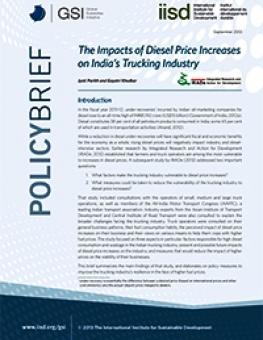
The Impacts of Diesel Price Increases on India's Trucking Industry
In the fiscal year 2011-12, under-recoveries incurred by Indian oil-marketing companies for diesel rose to an all-time high of US$15 billion.
Diesel constitutes 38 per cent of all petroleum products consumed in India, some 65 per cent of which are used in transportation activities.
While a reduction in diesel under-recoveries will have significant fiscal and economic benefits for the economy as a whole, rising diesel prices will negatively impact industry and diesel-intensive sectors. Earlier research by Integrated Research and Actionfor Development (IRADe) established that farmers and truck operators are among the most vulnerable to increases in diesel prices. A subsequent study by IRADe addressed two important questions:
- What factors make the trucking industry vulnerable to diesel price increases?
- What measures could be taken to reduce the vulnerability of the trucking industry to diesel price increases?
That study included consultations with the operators of small, medium and large truck operators. The study focused on three aspects in particular: factors responsible for high diesel consumption and wastage in the Indian trucking industry; present and possible future impacts of diesel price increases on the industry; and measures that would reduce the impact of higher prices on the viability of their businesses. This policy brief summarizes the main findings of that study, and elaborates on policy measures to improve the trucking industry's resilience in the face of higher fuel prices.
You might also be interested in
Increased Support Needed to Achieve India's Clean Energy Goals
India is on track to achieve many of its 2030 clean energy goals but needs to step up government support measures to accelerate the deployment of offshore wind, electric vehicles, and green hydrogen, according to a new report.
India Faces Clean Energy Challenges as Energy Demand Soars and Global Fossil Fuel Subsidies Rise
New research finds the global energy crisis and increasing energy demand have pushed India's energy subsidies to a 9-year high.
G20 energy ministers call for cooperation on nuclear energy & low-emission hydrogen
The Group of 20 energy ministers' meeting concluded in Goa on July 22, 2023, with the final summary failing to include language on the phase-down of unabated fossil fuels.
Implementing Solar Irrigation Sustainably
This guidebook provides recommendations to state policy-makers on how they can implement solar irrigation models, particularly decentralized solar plants for irrigation under the PM-KUSUM scheme, effectively and sustainably.